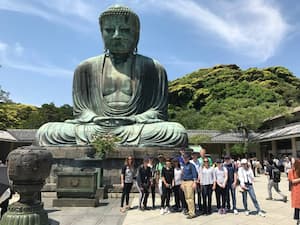Saint Stephen’s has enjoyed a significant international student population for decades, and our Global Initiative formally began with a single relationship with a school in Tanzania in 2007. Today, there are six schools considered Saint Stephen's "sisters" – in Tanzania, Japan, Argentina, Denmark, Honduras, and Spain.
In the early days of the program, the new videoconferencing technology provided by Skype was utilized to help Saint Stephen’s begin to shrink the globe. Visitors to campus now will encounter individual classrooms tuning in daily to interact with students in Canada, Kazakstan, Brazil, Mexico, Peru, Italy, or elsewhere, and the program has evolved to include many other technologies.
Middle school students have created a YouTube video exchange with classes in Kenya, China, and Sweden. Sixth graders used Padlet to discuss books they’ve read with students around the country and the world. Eighth graders have shared photos through Google Drive with students in Mexico, who used the images to create sketches they returned to their Saint Stephen’s counterparts.
Global lessons are taught at every grade level and in every discipline. Students benefit when they share perspectives with their international peers and their learning reaches beyond the four walls of our school to create a collaborative global classroom.
International travel is also a key component. Saint Stephen’s students travel annually to Eisbjerghus Internationale School in Denmark, and the first trip to our sister school in Cordoba, Argentina took place in spring 2018. SSES families host students from those schools on return visits to Bradenton each year.
Through this important initiative, students at Saint Stephen’s get the opportunity to know their global neighbors, have fun together, and work on solving common problems. Our students learn to face the challenges of the future and become globally-competent citizens.







